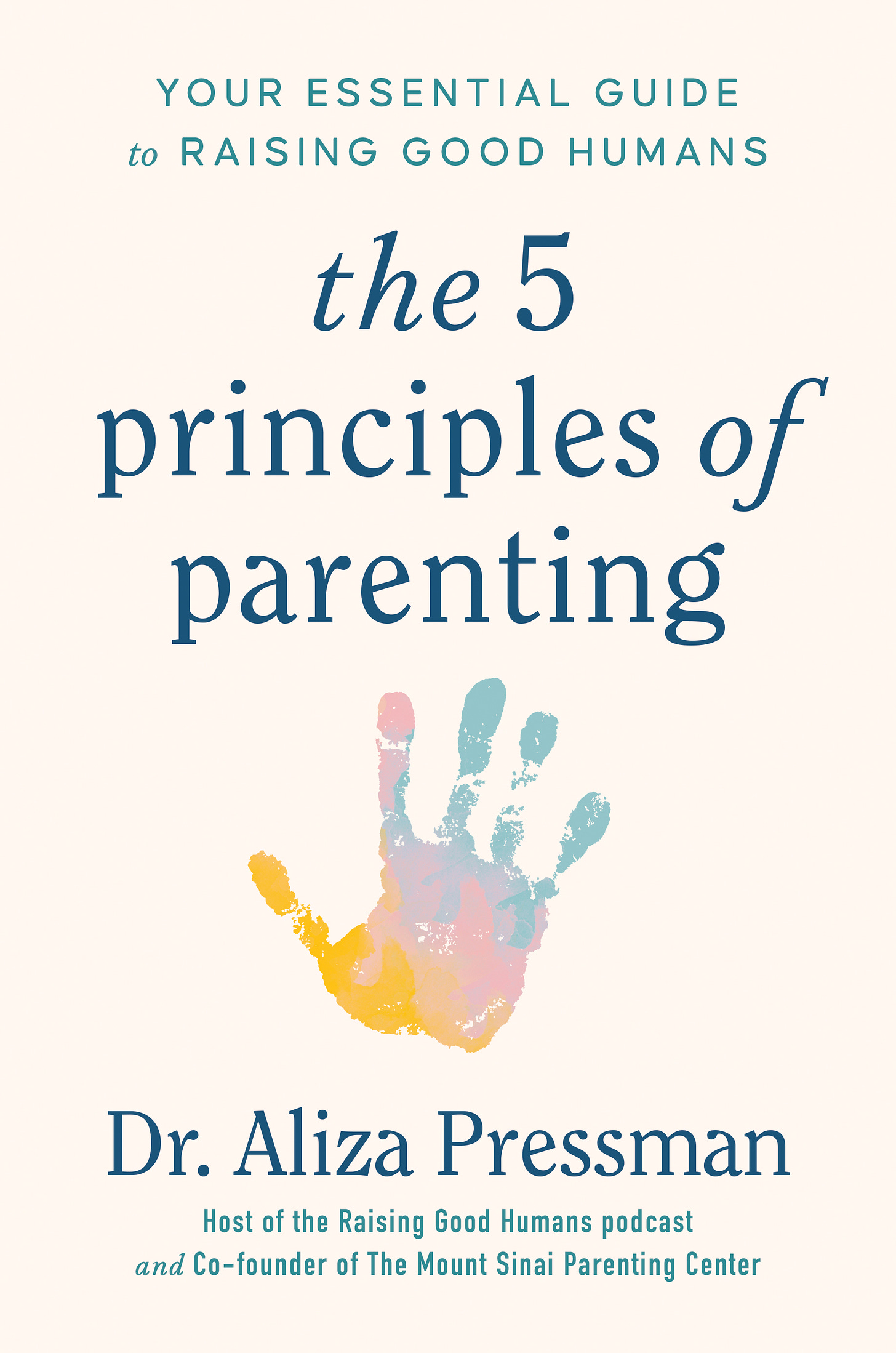5 Keys to Talking about Family Addiction History with Your Teen
Why knowing addiction history matters
Thanks for reading Raising Good Humans on Substack! My first book, The Five Principles of Parenting: Your Essential Guide to Raising Good Humans is now available for preorder here. All pre-orders will allow for access to exclusive LIVE events and will be eligible for exclusive bonus content this Fall. I am SO GRATEFUL for you and SO excited to get this book out into the world!

Having addiction in your family is a hard, but necessary, subject to broach with your tween or teen. As we discuss in this week’s episode - part 1 of a 2 part series - substance misuse disorders have a genetic component, and just like any other family history, from heart disease to breast cancer, your children need to know their risk.
It’s worth remembering that adolescents approach drinking and substances without the benefit of a fully developed prefrontal cortex. While the parts of their brain that are attuned to pleasure and reward-seeking are well formed, the parts of their brain that can think through consequences, resist impulses, and display critical thinking, have a ways to go. From a development perspective, teenagers are not equipped to make choices that seem obvious to us adults.
The other part of the equation is recognizing that substances have a more damaging effect on the developing brain. Memory and motivation are two of the central areas that can be impacted - both critical to an adolescent’s ability to learn, care about their futures, and to develop key life skills. Just at the time when parents want their children to take a leap forward into adulthood, drug and alcohol use can slow that progress, delay that important development, and change the trajectory of a teen’s life.
For these reasons, it is essential that we have explicit conversations with our children that we may rather avoid…especially when it comes to our own family history. (More on conversations to have in the episode, and stay tuned for part 2!)
5 keys to talking about family addiction history with your teen.
Recognize the stigma. The reason you may NOT have had an open conversation with your teen up until this point is because of the stigma that surrounds addiction. Admitting to substance misuse continues to be a difficult task in our society, and fear around judgment continues to keep this issue buried. Instead, some suggest we rethink addiction as a disease or as a symptom of a disease. Just as you would explain to your child that people in their families have diabetes and therefore they need to be careful about their diet, exercise, and lifestyle, you can tell your child that there has been a history of substance misuse or addiction. Be straightforward, honest, and non-judgmental. Just as you would be with your child regarding any other medical condition.
Understand the statistics. Genetics dictates 50% of the likelihood of developing addiction. That means that a few too many drinks could lead your child to have a long term problem, while another child has no lasting effects. Explain to your child that “routine experimentation” looks different for them, and that walking away may be more difficult based on their family history. This can help reduce their likelihood of misuse.
Empower well informed choices. Giving your child this information means that they can use it to understand their behavior in a new way, just like they would do if they had other genetic risks. Make a plan for how they can respond to drugs or alcohol in their environments, and how to set themselves up for success. This may mean confiding in a friend and having a sober “buddy,” putting themselves in different social situations with less pressure, or setting a limit for themselves that they can feel confident enforcing.
Discuss warning signs. Talking to teens about what signs to look for in themselves - such as using more heavily than their friends, being really drawn to using, or finding themselves unable to plan and think in social situations - can help them to establish safer practices as they transition out of the home. Make it known that help is available, and that talking about issues that arise will not be met with anger, but with assistance.
Keep the door open. This is not a one time lecture but an ongoing conversation. Start early (if you can), way before your child thinks they would ever try a drink or a drug, and keep it up often. Talk about other adults (or young people) using or drinking around them, in movies, and in your family, and share your family values and expectations about their use. Parents have the ability to strongly influence our children’s choices, even when we least expect it. Starting early, and keeping the door open to future questions and conversations, can make a world of difference in staying connected.
Finally, if risk runs particularly high in your family, paying attention to how and why we drink is important. Having some wine at a gathering is different from walking in the door and saying, “I had a tough day, I need to pour myself a cocktail”. Make sure your behavior represents the values you are discussing with your children, and that you are consistent about what you say and what you do. Of course, plenty of children with a history of misuse in their family will be fine - this is about reducing the risk where and when we can.
So much more to this, stay tuned for part 2!
A quick reminder to pre-order my first book, The Five Principles of Parenting! In it, I’m helping you to translate science into everyday challenges, and when you pre-order you get special benefits - including a virtual seminar, and custom content specifically made for you. AND when you pre-order, you are helping me SO MUCH. Every single person who pre-orders the book, helps book sellers and shops to see that demand is high and convince them to stock The Five Principles of Parenting on their shelves. I need your help to make sure that happens, and so I promise special benefits to make it worth taking the lap to pre-order today.






I believe that children know when our loved ones have a problem. They see the behavior at family gatherings, holidays, etc. Thank you for pointing out the notion that substance use disorders are diseases. It is easier to discuss then, like any other disease that must be managed. Thank you for bringing up this subject, so important for parents of tweens and teens to discuss, before they start to experiment.
What a fantastic article about a very important topic that everybody should be aware of (adults AND kids!). I wish someone had explained this to me when I was little.
My daughter is older now, but as she was growing up I noticed that the more I learned about this inner work (and began writing about it, even), the more I was able to help her to understand about herself, as well. AND her parents. Because we all have that voice, and we all react to it at times, particularly in stressful moments. But when we recognize it, we can name it, and heal from there.
Thank you so much for this!